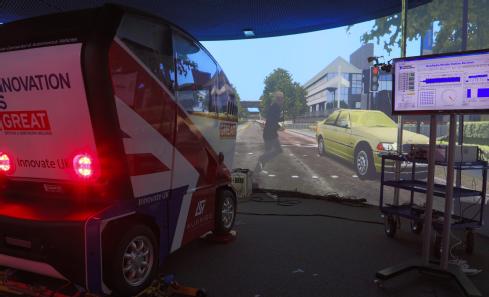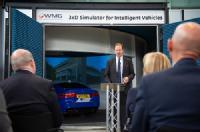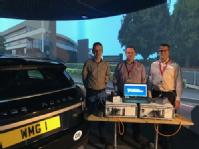WMG News
Researchers set an autonomous vehicle communications record using 5G - a movie’s worth of data sent in seconds
Researchers in WMG at the University of Warwick have set a new 5G communications speed record to a “Level 4” low speed autonomous vehicle in the pioneer 28 GHz millimetre wave band. They hit 2.867 gigabits per second in over-the-air transmissions, which is nearly 40 times faster than current fixed line broadband speeds. It is equivalent to sending a detailed satellite navigation map of the United Kingdom within a single second, or the full contents of a high definition blockbuster film in less than 10 seconds.
However this crucial wireless communications technology is not just being designed to deliver HD content to in-car entertainment systems, but it will allow autonomous vehicles to rapidly share large quantities of data with each other and with traffic management systems. This will include precise 3D road maps created by LiDAR (like radar but it uses laser light instead of radio waves), high definition video images of the vehicles surroundings, and traffic information.
Young Alumni Achiever Award for WMG Principal Engineer
 Principal Engineer Siddartha Khastgir has been presented with a prestigious Young Alumni Achiever Award from the Indian Institute of Technology (IIT) Kharagpur, India.
Principal Engineer Siddartha Khastgir has been presented with a prestigious Young Alumni Achiever Award from the Indian Institute of Technology (IIT) Kharagpur, India.
Siddartha graduated from IIT in 2011 before going on to complete a PhD at WMG, under the supervision of Professor Paul Jennings , on developing testing methodologies for ensuring the safety of autonomous vehicles. He is now a Principal Engineer within our Intelligent Vehicles capability.
Formula 1 driving simulation technology could help put the UK on the fast track to self-driving vehicles
A new research programme by WMG at the University of Warwick, and XPI Simulation, co-funded by Innovate UK, is examining the potential for applying the simulation technology used to train Formula 1® drivers for the testing and certification of autonomous vehicles. The market for such vehicles is expected to reach £52 billion by 2035, according to government figures.
The new research could dramatically reduce the time to market, helping manufacturers to achieve the UK government’s vision for self-driving vehicles to be operating on our roads as early as 2021.
Several manufacturers are already testing their vehicles on public roads, with mixed results. One of the problems is the volume and repeatability of testing. Carrying out such testing on controlled tracks or on-road presents significant cost and safety challenges – as well as requiring huge amounts of mileage to be driven to gather evidence.
Transport Minister visits WMG to launch Call for Evidence on the Future of Mobility and announce 6 research projects on autonomous vehicles
 Jesse Norman MP, Parliamentary Under Secretary of State for the Department for Transport, visited WMG today (Monday 30th July 2018) to launch the Government’s “Call for Evidence on the Future of Mobility”. He announced six Innovate UK funded autonomous vehicle research projects, saying:
Jesse Norman MP, Parliamentary Under Secretary of State for the Department for Transport, visited WMG today (Monday 30th July 2018) to launch the Government’s “Call for Evidence on the Future of Mobility”. He announced six Innovate UK funded autonomous vehicle research projects, saying:
“We are beginning to experience profound change in how we move people, goods and services around the UK’s cities, towns and countryside. The Future of Mobility Grand Challenge – part of the Government’s Industrial Strategy - aims to capitalise on the opportunities presented by these changes to help reduce emissions, improve safety and wellbeing and place the UK at the forefront of global transport innovation. The Call for Evidence will help inform this programme, and seeks views from a range of audiences right across the country.”
Two of the six research projects he announced involve WMG, at the University of Warwick, with a total of £4.1m in research funding from Innovate UK
Midlands Future Mobility in the driving seat to transform the environment for connected vehicles
 Midlands Future Mobility will use over 50 miles of Coventry and Birmingham roads to establish the Midlands as a world class UK centre for the development, and evaluation of, connected and autonomous vehicles (CAV) and related technologies and services.
Midlands Future Mobility will use over 50 miles of Coventry and Birmingham roads to establish the Midlands as a world class UK centre for the development, and evaluation of, connected and autonomous vehicles (CAV) and related technologies and services.
Midlands Future Mobility will be at the heart of the UK’s transport network, making a significant contribution to the UK’s national transport strategy, and will play a crucial role in shaping the transport sector. It will firmly establish the UK’s presence in the connected and autonomous vehicle market, and contribute to the UK’s Industrial Strategy.
The specially selected networked roads cover a range of representative areas and will be the largest, most diverse testing environment in the UK, with the deployment of new roadside infrastructure including smart vehicle monitoring, data analytics and 5G ready wireless infrastructure. By using real-world environments Midlands Future Mobility will enable a variety of industries to test new vehicle technologies and services, with the aim of improving integration.
WMG enhances collaborative R&D capability with the UK’s most advanced 5G mmWave test platform
Mobile telecommunication operators, infrastructure suppliers, car manufacturers, and local councils are all seeking to understand the benefit from the leap in bandwidth promised by 5G technologies, and are lining up to use the very latest 5G evaluation technology now available at the University of Warwick.
WMG at the University of Warwick has just acquired the UK’s most advanced diagnostic and testing platform for a key part of the 5G spectrum - mmWave. This technology promises to deliver a step change in the amount of data that can be wirelessly transmitted, opening up opportunities for a range of new services and products, including those associated with enabling connected and autonomous vehicles (CAVs).
This has been provided by a £250,000 WMG Centre HVM Catapult award for facilities and people alongside an equipment collaboration with National Instruments (NI) for their mmWave technology platform.
 WMG’s Connected and Autonomous Vehicles research team are already working with a range of industrial partners on connectivity, verification and validation, and the understanding and optimisation of user/customer interaction with driverless technology. This new facility will further enhance WMG’s vison to be the UKs “go to” CAV development platform providing unrivalled research and testing that will accelerate product introduction, infrastructure design and implementation. The technology developed will be transferable to other sectors beyond automotive.
WMG’s Connected and Autonomous Vehicles research team are already working with a range of industrial partners on connectivity, verification and validation, and the understanding and optimisation of user/customer interaction with driverless technology. This new facility will further enhance WMG’s vison to be the UKs “go to” CAV development platform providing unrivalled research and testing that will accelerate product introduction, infrastructure design and implementation. The technology developed will be transferable to other sectors beyond automotive.
WMG to test new location system for intelligent vehicles
Intelligent vehicles and smart devices could gain more accurate location awareness by ‘fusing’ Global Navigation Satellite Systems (GNSS) and WiFi signals – and a test for this is the focus of an Innovate UK project led by Spirent Communications and involving WMG at the University of Warwick.
The £694k ‘Enhanced Assured Location Simulator Leveraging WiFi and GNSS Sensor Fusion’ (ELWAG) project will seek to develop to test this pioneering hybrid WiFi and GNSS location system in a cost-effective, repeatable and safe environment – so that manufacturers can verify its performance.
Researchers at WMG, led by Dr Matthew Higgins, will play a significant role in the project. They will take physical layer measurements of both Wi-Fi and GNSS signals in Autonomous Vehicle scenarios, in and around the University of Warwick campus and the local urban road network.
WMG to help Jaguar Land Rover develop self-driving car that can ‘see’ around corners
 WMG at the University of Warwick is to work with Jaguar Land Rover in a key part of a £4.7 million project called AutopleX which will develop vehicles that can ‘see’ around corners and through obstacles, enhancing the capability of self-driving cars.
WMG at the University of Warwick is to work with Jaguar Land Rover in a key part of a £4.7 million project called AutopleX which will develop vehicles that can ‘see’ around corners and through obstacles, enhancing the capability of self-driving cars.
Jaguar Land Rover is leading AutopleX project to investigate pioneering safety technology for self-driving technology The Innovate UK funded project combines connected, automated and live mapping tech to allow self-driving cars to ‘see’ and ‘talk’ to each other and it brings together Jaguar Land Rover with WMG at the University of Warwick and Highways England, INRIX, Ricardo, Siemens, and Transport for West Midlands.
WMG will bring scientific expertise in the area of connected autonomous driving systems, V2X systems, physical and virtual validation, and cyber security. Using their unique vehicle simulation facilities they will work with partners to create insight prior to physical tests as well as post trial impact assessment in various scenarios that cannot be carried out in physical test due to the environmental restrictions. WMG will also advise the project team on cyber security aspects and will continuously assess resilience of the AutopleX systems against potential cyber-attacks.
WMG establishes new Centre for Applied Artificial Intelligence
WMG, at the University of Warwick, is investing in data driven innovations with a new Centre for Applied Artificial Intelligence. The Centre will enable industry and business to leverage large volumes of digital information to gain competitive insights through Artificial Intelligence methods.
This new centre brings together several applied areas of activity where WMG has an established track record of excellence. It will support the continued expansion of existing research groups in response to the ever-changing landscape of UK industrial needs. Two new appointees, Professor Giovanni Montana and Professor Mehrdad Dianati, will spearhead the Centre working closely with other academic colleagues in Intelligent Vehicles, WMG Cyber Security Centre and the Institute of Digital Healthcare.
WMG in £2 million programme to help SAVVY drivers avoid collisions and accidents
WMG, at the University of Warwick, are the academic research leads in a new £2 million Innovate UK funded research programme that will help create new forms of technological assistance to help drivers to avoid collisions and accidents.
